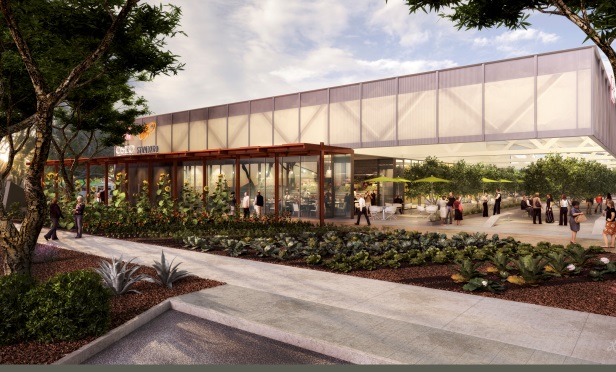 SkySong’s retail building is part of the mixed-use project’s footprint.
SkySong’s retail building is part of the mixed-use project’s footprint.
SCOTTSDALE, AZ—A new study by the NAIOP Research Foundation offers insight into the development and growth of innovation districts. These districts are economic development tools based on the notion that entrepreneurship and innovation can be stimulated in environments that satisfy space needs of companies in different life cycle stages and encourage employees to interact in a mix of settings.
The study provides a better understanding of the factors contributing to the success of these projects, as well as the challenges that must be frequently overcome. It also examines the structure of these transactions in terms of design features, financing structures, partnership arrangements, leasing strategies and policy objectives in an attempt to determine how each of these elements affects a project’s outcome.
“Innovation district investments are expected to yield substantial returns in terms of economic diversification, job growth and the commercialization of new ideas in post-industrial cities, where competitive advantage often stems from product and process improvements made possible by collaboration,” said Thomas Bisacquino, NAIOP president and CEO.
Some common features of innovation districts that encourage collaboration and business growth include incubators, accelerators with support services and/or capital, short-term flexible office/lab space with management in place, networking and collaboration programs, affordable housing options for employees with unique demands, and spaces encouraging informal interactions.
The report, authored by Dustin C. Read, assistant professor of property management and real estate at Virginia Tech, details one such innovation district, SkySong, the ASU Scottsdale Innovation Center, located on the site of a former defunct regional mall. Arizona State University, the ASU Foundation for a New American University and the city of Scottsdale joined together in 2005 to redevelop the property with the goal of revitalizing the area by attracting technology firms.
Aaron Matos, founder and CEO, Jobing.com, tells GlobeSt.com: “I have always been impressed with resources Arizona State University provides to cultivate exceptional talent. It is because of this that I have decided to move all Jobing operations to ASU’s SkySong facility to not only help foster further developments in our software and products, but also tap into their technology-driven talent pool.”
This 42-acre mixed-use development project will include 1.2 million square feet of office, lab and meeting space at buildout, as well as 12,000 square feet of retail space and 325 apartments. SkySong is projected to generate more than $32 billion in economic output and more than 10,000 new jobs during the next 30 years, according to an analysis performed by the Greater Phoenix Economic Council.
“SkySong is built on the deep connections and continuous collaborations between the forward-thinking city of Scottsdale, entrepreneurs, Arizona State University and the community at large,” said Sharon Harper, president and CEO of Plaza Companies. “Its growth is a testament to innovation–in planning, in collaborating, in design and construction, and in vision. When you take into account the technology, research and innovation that occurs on a daily basis at SkySong, it’s hard to deny its potential for future economic success.”
In addition, companies located at SkySong enjoy a special relationship with Arizona State University, which has more than 90,000 students studying across four metropolitan Phoenix campuses, in Lake Havasu and online. ASU is one of the largest public universities in the nation, with the majority of its students attending its campus in Tempe, AZ, less than three miles from SkySong. In addition to locating its own innovative research units at the center, through ASU’s on-site operations, tenant companies have a single point of contact for introductions to researchers, faculty and programs to address their specific needs.
“This kind of significant economic impact is what the foundation envisioned at the outset of this project. We wanted to ensure the creation of an environment that made innovation a cornerstone of the culture and that those who wanted to come to Scottsdale had all possible resources available to them to help them succeed here,” said Sethuraman Panchanathan, senior vice president for knowledge enterprise development at Arizona State University. “Most of the companies at SkySong have enjoyed positive results and their employees, and by extension the community as a whole, have benefited.”

















 Copyright © 2024 ALM Global, LLC. All Rights Reserved.
Copyright © 2024 ALM Global, LLC. All Rights Reserved.